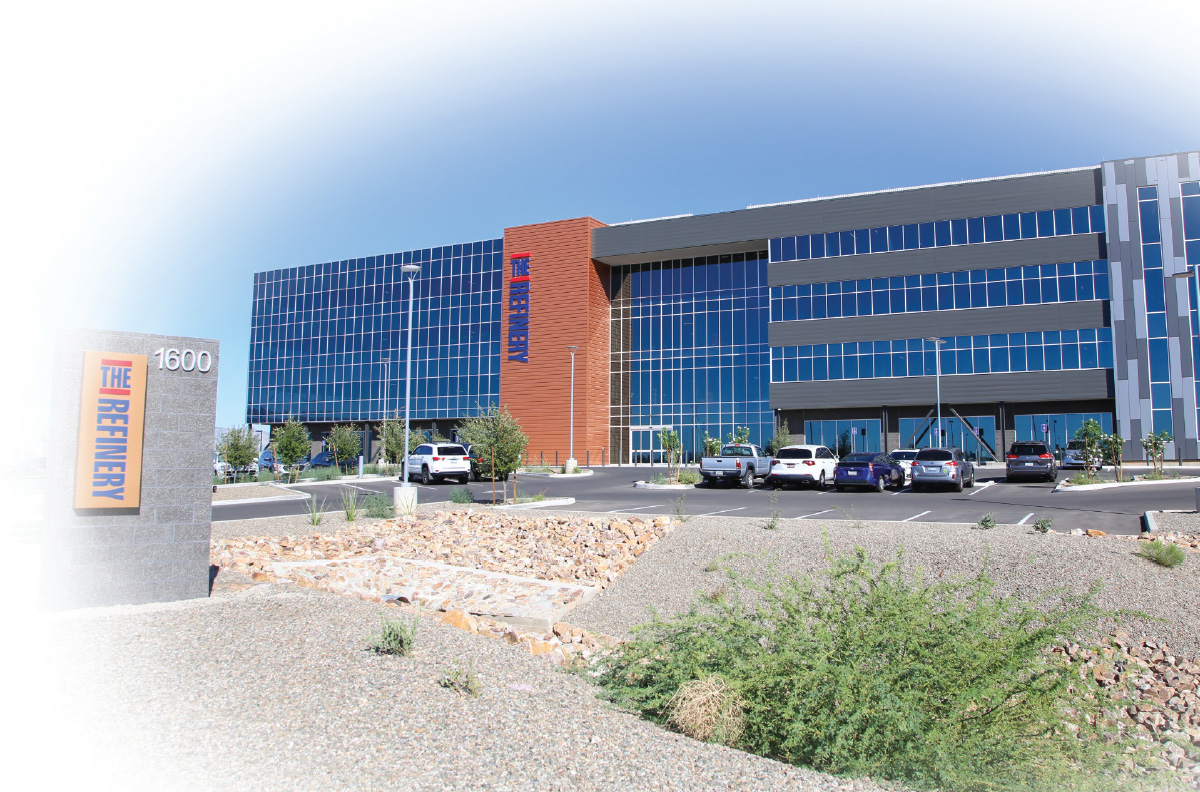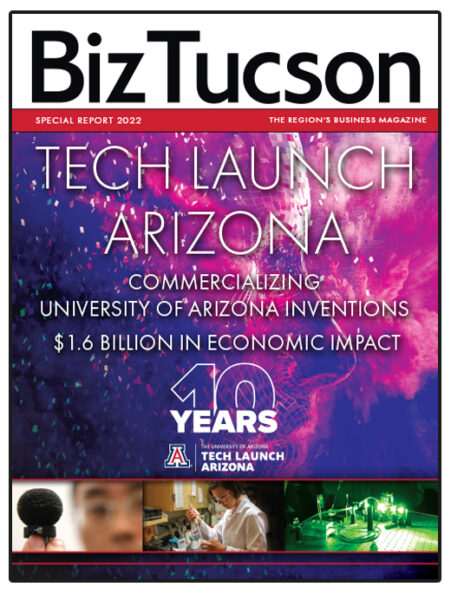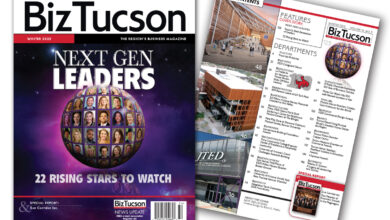
Launching an Innovation Ecosystem
Tech Launch Arizona Posts $1.6 Billion in Economic Output
By Jay Gonzales
Though its decade at the University of Arizona may only be a blip in the school’s 137-year history, Tech Launch Arizona’s economic impact is already immense.
As the university’s technology transfer arm, TLA’s work to advance intellectual property, patents, licenses, and startups – and the resulting impact on the region’s economy in the form of metrics like jobs and tax revenues – are making it a key component to developing what Betsy Cantwell calls an “innovation ecosystem” for the region and beyond.
“I’m absolutely convinced we will develop more and more startups here in the region, some of which will become unicorn powerhouse companies,” said Cantwell, senior VP for research, innovation, and impact at UArizona, where TLA reports in the campus organization structure.
A study of TLA for the five years from July 2016 through June 2021 determined that its work had generated $1.6 billion in economic output. The figure includes about $561 million in labor income, $59 million in tax revenues and more than 2,500 jobs supported.
The future is even brighter, the study indicates. Over the next 10 years, TLA is projected to generate another $4.7 billion in economic output, $1.6 billion in labor income and $172 million in tax revenues.
In the 10 years TLA has operated, there have been more than 125 startup companies formed, more than 490 licenses signed, and more than 500 patents issued to protect university research and technology, clearly establishing it as a driver of the overall economic development of the region.
“Harvard, Stanford and other places have been at this for 50, 60, 70 years,” said UArizona President Dr. Robert C. Robbins. “It’s part of our mission to develop new companies in the region, new job opportunities, to help the economy of Southern Arizona and to also give our students opportunities to stay here.”
The general nature of the research being commercialized through TLA means that it is actually in its infancy when it comes to having massive regional economic impact, said Associate VP Doug Hockstad, who joined TLA in 2013 and was promoted to head the office in 2018 when the original VP, Dave Allen, retired.
Many of the inventions, particularly new therapeutic drugs and other inventions in the life sciences, take years to get the approvals needed to go to market. They also require venture capital – an area where TLA also has an economic impact by attracting investment from inside and outside Arizona.
“We strongly feel the more that we grow this region, the more small companies, medium companies and large companies that we have, the more investment we’ll see coming in,” Hockstad said. “There will be more reasons for companies to stay here, and perhaps more importantly, more reasons for graduates to stay.
“The old adage is, ‘Go to the coast to find the money.’ They won’t have to do that because it’s going to be here. We’re starting to see that more. We have at least a half dozen venture funds in Arizona now.”
One of those is UAVenture Capital, a fund started by local businessmen Fletcher McCusker and longtime business partner Michael Deitch specifically to fund startups associated with the university and usually launched through TLA. The idea to establish the fund was pressed by Robbins when he took the president’s job in 2017. McCusker had just engineered a $130 million sale of a company, SinfoníaRx, that was borne from a University of Arizona innovation.
Robbins “kind of nonchalantly asked me, ‘Can you do it again?’ I go, ‘Yeah.’ He says, ‘No, can you do it again and again and again.’ He said we need a fund, some risk capital to help these startup companies get off campus,” McCusker recalled.
UAVenture Capital has invested $30 million into 11 companies that have emanated from the university, McCusker said.
Cantwell sees all of this as the start of the innovation ecosystem.
She spent a portion of her educational and professional life in northern California, where she witnessed the development of Silicon Valley as a poster child for an innovation ecosystem. She holds a doctorate in mechanical engineering from the University of California, Berkeley. She worked in a technology firm in the area and she also studied how Silicon Valley developed.
“When it started it was nothing,” Cantwell said. “Stanford was nearby, but that area did not even have silicon until Fairchild Semiconductor started there. There was a NASA base and a university.”
For the Tucson region to continue to establish itself as an ecosystem, Cantwell said, organizations and interests from all sectors, public and private, must contribute. The work done at TLA demonstrates that all things are possible.
“First, you’ve got to have the ideas. Then you’ve got to have the support system that Doug’s unit (TLA) provides to perfect patents, create the IP,” she said. “You’ve got to have an ecosystem within the university that allows them to get started. You’ve got to bring funders to the table early. They’ve got be able to find reasonably inexpensive labor. They’ve got to have places to go. They’ve got to have support services for startup companies. And they’ve got to have the right regulatory and legal environment.”
Some of those pieces are already working within UArizona.
TLA has a strong partnership with the university’s Tech Parks Arizona, even moving into the new building known as The Refinery at the Tech Parks at the Bridges where both units can work in close proximity. Tech Parks provides space and facilities for startups to get their businesses going in an environment where they can still be close to the university where many of the technologies are developed.
Tech Parks has 83 startup companies operating through its University of Arizona Center for Innovation, the university’s affiliated startup incubator.
“It’s really key that we’re in lockstep with Tech Launch Arizona and the entire ecosystem,” said Carol Stewart, VP of Tech Parks Arizona. “I think people are figuring it out. They’re watching us and they’re like, ‘There is something pretty grand going on.’ ”
Over the long haul, Hockstad said, the type of ecosystem developing with organizations like TLA and Tech Parks and with full support of one of the region’s largest entities and employers, the university can feed on itself by keeping students and researchers within the region as a foundation for the economy, even if not all the newly formed companies succeed.
“One of the things that I believe is that if we can create an ecosystem here where graduates can go right to a company or can feel comfortable going into a startup, that’s to everyone’s benefit because even if that startup fails, there’s another startup company or medium-sized or large company that they can go to. We get to retain a lot of our incredibly intelligent students,” Hockstad said, “and then we create an ecosystem that kind of feeds on itself as companies launch and/or fail and/or succeed.”






